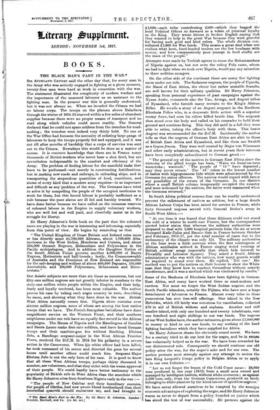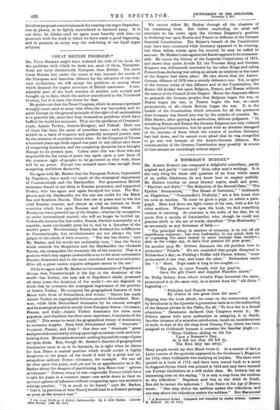BOOKS.
THE BLACK MAN'S IN THE WAR..
Ste ArrorrArro GEDDES said day that, for every man in
the Army who was actively engaged in fighting at a given moment, twentvfour men were 'hard at work in connexion with the war. The statement illustrated the complexity of modern warfare and the importance of the smarmed labourer as an assistant to the fighting man. In the pretreat war this ie generally understood, but it was -not always so. When we invaded the Crimea we had no labour corps. The troops on the plateau above Balaclava through the winter of 1854-55 starved within a few miles of abundant supplies 'because there were no proper means of transport and no road along which vehicles could move readily. The General declared that he could not spare soldiers-from the trenches-for road. making,; the trenches were indeed very thinly held. No one at the War Office had foreseen the necessity of enlisting'large gangs of labourers to 'keep the troops properly fed and equipped, and it was not till after. months of hardship that a corps of navvies was sent out to the 'Crimea. Nowadays this would be done as a matter of course. It is common knowledge that there are in -France many thousands of British workers who never hear a shot fired, but are nevertheless indispensable to the comfort ,and efficiency of the Army. The problem of finding labour for the manifold teaks that have to be performed—not merely in constructing fortifications, but-in making new roads and railways, in unloading ships, and in transporting the stupendous quantities of food, munitions, and etoree of every kind that a modern army requires—is as important- and difficult as any problem of the war. The Germans have tried to solve it -by compelling the people of the occupied territories to work for them, .but this forced labour is -probably inefficient .ae a rule .because the poor slaves are ill fed and harshly treated. We have done better because we have called on the immense reserves of coloured labour in the Empire to supply voluntary workers, who are well fed and well paid, and cheerfully assist us in the etruggle for liberty.
Sir Harry. Johnston's little .book on the part that the coloured races are playing in the war is interesting and informing, especially from -this point of view. He begins by reminding us that
The United ',Kingdom of Great Britain and Ireland rules more or leas -directly acme 44,700,000 Africans, about 1,700,000 Aire, mericans in the West Indies, Honduras and Guiana, and ,about 338,000 .Oceanic Negroes, Melanesians and Polynesians in the • Pacific arohipelagoea. And in addition the Daughter Nation of the South African Union governs another 6,0M,000 of Bantu Negroes, Hottentots and 1181f-breeds ; lastly, the Commonwealth of Australia and the Dominion of New Zealand are responsible for the safe-keeping and welfare of about 400,000 Papuans, 150,000 Australoids, and 100,000 Polynesians, Melanesians and. Micro- nesians."
Our. Asiatic subjects are more than six times as numerous, but our fifty-one million negroes are not.greatly inferior in numbers to the sixty-one million white people within the Empire, and their help, freely and loyally tendered, has been moat valuable. The author proves his epee by taking each negro country in turn, describing, its laces, and showing what they ,have done in the war. British West Africa naturally comes first. Nigeria alone contains over sixteen million negroes, some of whom are among the best native troops that we have. The French Senegalese battalions have donel magnificent service on the Western Front, and their southern! neighbours-under our rule have an equally fine record in the African campaigns. The -Hausa of Nigeria and the Mendingoee of Gambia and Sierra -Leone-make first.rate soldiers, and have faced German- troops and their maohine.gun fire without flinching. Ebrima Jain, a Handbag° sergeant-major in the West African Frontier Force, received the D.C.M. in 1910 for his gallantry in a severe action in the Cameroon.. When hie white officer had been killed, the took command of his sector and directed the guns for 'several !hours -until another officer could reach him. Sergeant-Major tEbrima Jalu.is not the only hero of his race. It is good to know. -that all these West African troops, perhaps thirty thousand in -number,-are volunteers, andthat they enlist with the warm approval. nf their people. We could hardly have better testimony to the! popularity of Itirtish rule .in West Africa than the anecdote which; Sir Harry Johnston citee from Southern Nigeria earlyin She war :—. " 'Ilse people of New Calabar and -their hereditary enemies,! the people of Okrika, had now sworn blood brotherhood (lest their; ,intertribal .:quarrels should entharreae us), and had brought in ...The Aiwa Won!. 1Flort -Um :War. dry OE :Harry 'S. Johnston. Seethe :I atuptio. Marrhal1, end Co. 115. 6d. net .£1,000—each -tribe contributing 1000—which they begged the Jowl Political Officer .to 'forward as a token of personal loyalty to the King. They wrote letters in broken English saying that they wanted to help in the great War because they were grateful forhaving such good and kind rulers. The whole division con- tributed /1,000 for War funde. This means a great deal when one realises what keen, hard-headed traders are the few headmen with money, and how comparatively poor .(except in food etuffs) are the mass of the people."
Attempts were made by Turkish agents to rouse the Mohammedans of Nigeria against ua, but not even the ruling Fula caste, whom we had to fight when we took over Nigeria, would pay any attention to these sedition-mongers.
On the other side of the continent there are many fine fighting races under our rule. The Sudanese negroes, the people of Uganda, the Masai of East Africa, the clever but rather unstable Somalis, are well known for their military qualities. Sir Harry Johnston. speaking from personal experience of past campaigns against the Nyasa Arabs, commends also the Tao, Atonga, and Angoni tribes of Nyasaland, who furnish many recruit,: to the King's African Rifles. He recalls a story of an Angoni sergeant in the Northern Rhodesia Police who, in •a.desperate little action with a superior enemy force, had seen his officer killed beside him. The sergeant then stood over the body and called on his comrades to hold their ground and continue firing. This they did until in a lull they were able to retire, taking the officer's body with them. This brave Angoni was recommended for the D.C.M. Incidentally the author tells us that the negroes of German East Africa are akin to those of British East Africa and Nyasaland, and like them use Swahili as a /input/ranee. They were well treated by Major von Vt'issmann and other early administrators, but in recent years their interests have been completely subordinated to German greed :— " The general cry of the natives in German East Africa since the victories of the allied troops has been, ` Vintu wa kumi-natano wametoka ; waairudi." The people of " 15 " have departed ; may they never return.' The ' 16 refers to the lowest number of lasbee with hippopotamus hide whisk were administered by the Germans for minor offences. The nativeswould regard with-terror any possibility of the return of the Germans. In one district where a small British column temporarily occupied the country and were welcomed by the natives, the latter were massacred When the-Germane returned."
InSouth Africa political reasons that can be readily understood prevent the enlistment of natives as soldiers, but a large South African Labour Corps has been raised for service in France, while forty thousand negroes served with General Botha'a army in South-West Africa :—
" At one time it was feared that these Africans could not stand the cold of a winter in north-east France, abut -the correspondent quoted below states that whereas the military authorities were prepared to deal with 1,000 hospital patients from the six or seven thousand Kafir-Zulus and Basuto then in France between October and February, 1010-17, yet the total number of cases due to the inclemency of the climate was only 124. The military authorities at the base were a little nervous when the first contingents of African auxiliaries arrived in France singing weird versions of -British soldiers' songs (especially that winch bids farewell to -Piccadilly and Leicester Square). They asked a South African administrator who was with the natives, how many guards would be required to stand over them. He replied, ` Not one.' His method was to put the natives on their honour to show the White man that they knew how to conduct themselves without outside interference, and it wawa method which was vindicated by results."
Some of the Mashona of Rhodesia have been fighting in German ffiast Africa, and many have worked there as road.makers and carriers. Nor must we forget the West Indian negroes and the South Pacific islanders, notably the Fijians, who have sent a large detachment of labourers to Francs. Almost every tribe in these possessions has sent free-will offerings. One island in the New Hebrides, which till lately was notorious for cannibalism, collected -£70 in aid of British widows and orphans. Another and still smaller island,with only one hundred and twenty inhabitants, sent one hundred end eight shillings to our war:funds. The negroas of our Weet Indies have, the author estimates, given about £2,000,000 in money or kind to our war funds, to say -nothing of the hard fighting battalions which they have supplied for Africa. Sir Harry Johnston draws the obviously sound moral. We have for a century tried to do our beet for the negro, and lie in return -has voluntarily helped us in the war. We have been rewarded for our disinterested rule. Consequently we should continue our old policy after the war, for the negro's sake and for our own. The author protests moat strongly against any attempt to revive the late King Leopold's Congo policy in Belgian Afrioa or to apply it in our own Colonies
" Let us not forget the lesson of the Cold Coast cacao 38,000 tons produced in one year (1912) from a small area owned and managed by intelligent natives,-without white overseers • as against 3,500 tons, only, from the German Cameroon,,produeed on Iands belonging to white planters by the hired labour of spiritless negroes." We have never allowed ourselves to be tempted by the aeemipg economic advantages of exploiting the negro, and Sir Harry Johnston warns us never to depart from a policy founded on justice which has stood the test of war auccessfully. He protests against the
frivolous proposals sometimes made for treating our negro Dependen- cies as pawns, to be lightly surrendered or bartered away. It is our duty, he thiuka—and we agree most heartily with him—to persevere with the work in which we have made a good beginning, and to promote in every way the well-being of our loyal negro subjects.















































 Previous page
Previous page